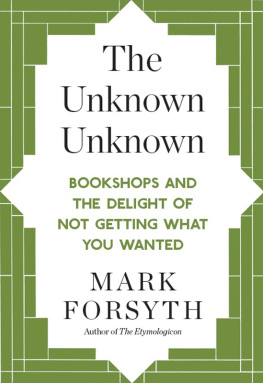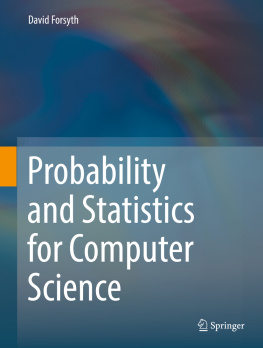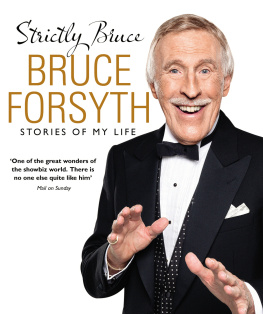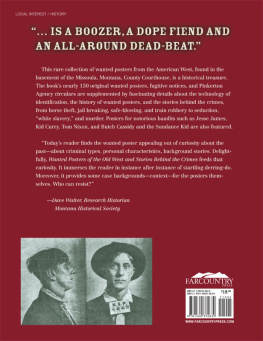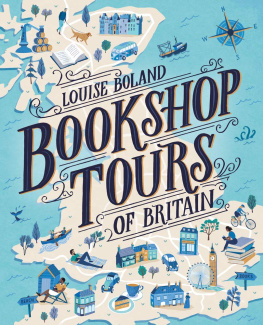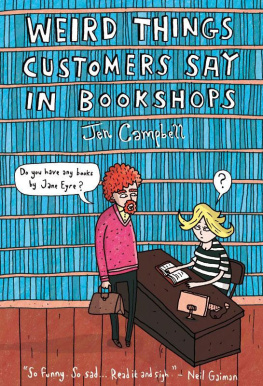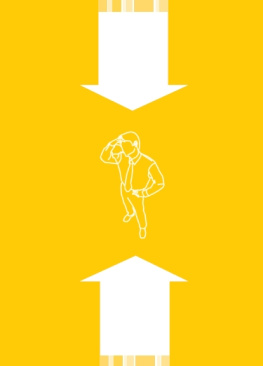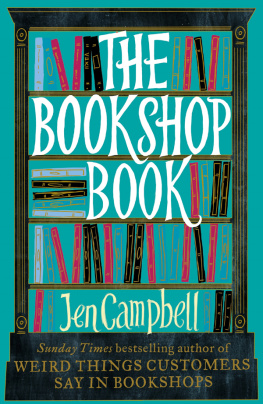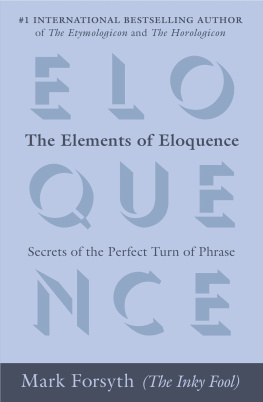The
Unknown
Unknown
BOOKSHOPS AND
THE DELIGHT OF
NOT GETTING WHAT
YOU WANTED
MARK FORSYTH

Published in the UK in 2014 by
Icon Books Ltd, Omnibus Business Centre,
3941 North Road, London N7 9DP
email:
www.iconbooks.com
Sold in the UK, Europe, South Africa and Asia
by Faber & Faber Ltd, Bloomsbury House,
7477 Great Russell Street,
London WC1B 3DA or their agents
Distributed in the UK, Europe and Asia
by TBS Ltd, TBS Distribution Centre, Colchester Road,
Frating Green, Colchester CO7 7DW
Distributed in South Africa
by Jonathan Ball, Office B4, The District,
41 Sir Lowry Road, Woodstock 7925
Distributed in Australia and New Zealand
by Allen & Unwin Pty Ltd,
PO Box 8500, 83 Alexander Street,
Crows Nest, NSW 2065
ISBN: 978-184831-784-0
Text copyright 2014 Mark Forsyth
The author has asserted his moral rights.
No part of this book may be reproduced in any form, or by any means, without prior permission in writing from the publisher.
Typeset in Minion by Marie Doherty
Printed and bound in the UK by Clays Ltd, St Ives plc
To Julia Kingsford
(Because Im too frightened not to)
About the author
MARK FORSYTH is a writer whose books have made him one of the UKs best-known commentators on words and the English language. His most recent book, The Elements of Eloquence, told the story of the flowers of rhetoric. The Etymologicon was a Sunday Times #1 bestseller and BBC Radio 4 Book of the Week, as was his second book The Horologicon. He writes the Inky Fool blog and has contributed articles to the Guardian, Daily Telegraph, Spectator, New York Times and Wall Street Journal among others. He lives in Clerkenwell, London.
The Unknown Unknown
M ost of my opinions on bookshops were formed by Donald Rumsfeld. In case youve forgotten, or never knew, Donald Rumsfeld was the American Secretary of Defense in the administrations of both Gerald Ford and the younger Mr Bush. He is often rather hysterically accused of starting unnecessary wars, believing he is above International Law, and being more interested in origami than in human life; but that is not all that he and I have in common. Its his opinion on the necessity of bookshops that truly binds us together.
There are things we know that we know. There are known unknowns. That is to say there are things that we now know we dont know. But there are also unknown unknowns. There are things we do not know we dont know.
For some reason that I shall never understand, there are those who find these lines perplexing. They ridicule it. The Plain English Campaign even awarded Mr Rumsfeld their Foot in Mouth Award of 2003 for a baffling comment by a public figure. But theres nothing baffling in it really. I know that Paris is the capital of France, but more importantly I know that I know Paris is the capital of France. I know that I dont know the capital of Azerbaijan, although Im sure that they have one. Its the sort of thing I really ought to check up on. But I do not know well, here it gets complicated. You do not know that you do not know the capital of Erewhon, because you had no idea that there was a country called Erewhon, and therefore you had no idea that there was a gap in your knowledge. You did not know that you did not know.
The same thing applies to books. I know that Ive read Great Expectations: it is a known known. I know that I havent read War and Peace: it is a known unknown to me (and barring a long prison sentence is likely to remain so). But there are also books that Ive never heard of; and, because Ive never heard of them, Ive no idea that I havent read them.
Id love to name one of these books that I havent heard of. Id love to give you examples, but, you see, I cant because Ive never heard of them. Tolstoy, Stendhal and Cervantes, these men follow me around. They stand in dark corners and eye me disapprovingly from beneath supercilious eyebrows. And all because Ive never got round to reading their blasted, thousand-page, three-ton, five-generation, state-of-a-nation thingummywhatsits. I dont care. Or rather, sometimes I do, and at other times I remember that Im a tortoise-slow reader and that theres a pub just around the corner. Testes to Tolstoy, thats what I say; and I say it in full knowledge of his vast reputation and beard.
But the others. Where are they? Who are they? Ive absolutely no idea. Theyre probably having a party next door. The best sort of party filled with beautiful wines and delicious women. But I am not invited. Not that I can blame them. Weve never met. And I cant find them, because I dont know their names. They are the unknown unknown, and I cant even pine after them, such is my double ignorance.
And thus and therefore the bookshop; for, though there is a popular myth that Mr Rumsfeld was discussing Mesopotamian weaponry, he was, of course, discussing methods of buying books. We are all a little misunderstood at times.
There are, as he said, three kinds of books: the ones youve read, the ones you know you havent read (like War and Peace), and the others: the books you dont know you dont know.
The ones youve read, you dont need to buy. Presumably, you bought (or at least filched) a copy before reading. The famous books that you havent read the known unknowns are easily obtainable: they are on the internet. You type in War and Peace and all sorts of book-traders mention that they have it available for tuppence hapenny, and that a nice young man will bring it to your door by tea time.
I believe that here I ought to bemoan the modern age and go on about how human contact is lost and were all going to Hell on a handcart, but I just cant. The internet is much too convenient. Perhaps life was a lot healthier in the days when everything was done in person. But it was much more time-consuming as well. Also, you can carry on this line of false nostalgia for ever. People hated paperbacks when they came in, and referred to them as penny dreadfuls. And I suspect that when Johannes Gutenberg invented the printing press in the 15th century, the monasteries were filled with monks saying that a printed Bible lacked the human touch. You can probably go all the way back to 3000 BC and find an Egyptian complaining that hieroglyphics were being pushed out by the new-fangled hieratic script. It never ends.
The world has moved on and all sorts of things have gone into the darkness steam engines, cassette tapes and smallpox. Shriek as we might, we dont truly want them back. The internet is a splendid invention, and it wont go away. If you know you want something, the internet can get it for you. My point, and the whole point of this essay, is that its not enough to get what you already know you wanted. The best things are the things you never knew you wanted until you got them.
The internet takes your desires and spits them back out at you, consummated. You search, you put in the words you know, the things that were already on your mind, and it gives you back a book or a picture or a Wikipedia article. But that is all. The unknown unknown must be found otherwhere.
STRANGE BOOKS
I am the proud possessor of a strange literary rarity: Fiction First: An anthology of short stories written by the employees of First UK Bus. Its actually remarkably good, and Ive never felt comfortable on a First UK bus since, as I see all other authors as potential threats. But you, dear reader, cannot buy this book. You will never own a copy because, as it says on the back, it is NOT FOR GENERAL SALE. The only reason I have a copy is that, like most of the nobler things in life, somebody had simply abandoned it in the changing area at the swimming ponds on Hampstead Heath, where I found it one April afternoon.
Next page
